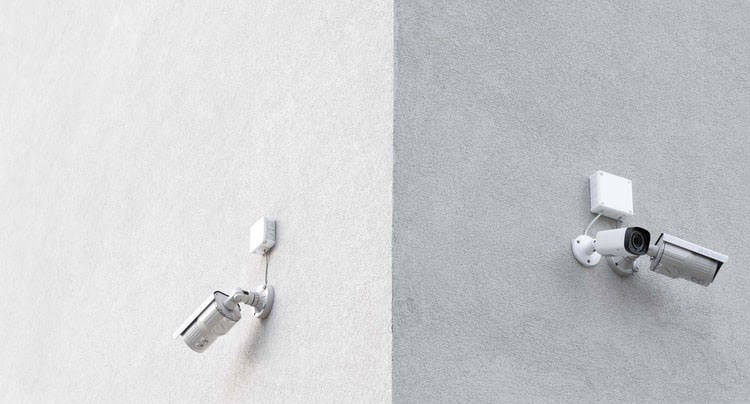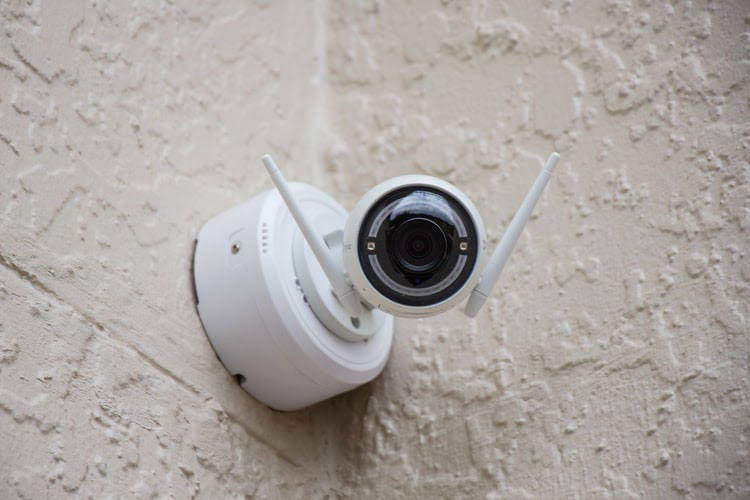Wired vs. Wireless Security Cameras
Posted by Gregory DeRouanna on Oct 1, 2020

When you’re looking for security cameras for your business or property, you want the best in video surveillance with features that guarantee reliability both indoors and outdoors. But before doing that, you’ll have to decide between two video surveillance options: wireless vs wired security cameras.
Whether you need a few wireless security cameras for your home or a complete business security system with multiple wired security cameras, it’s critical to understand the differences so you can decide which works best for you.

Wired Security Cameras
Wired security cameras are the most widely used video surveillance option today, from businesses to residential properties to commercial properties. Wired cameras require cables for power, internet connection, and video transmission. There are two primary types of wired security cameras to choose from today:
- HD-over-Coax security cameras - This has been the industry standard for the past decade. They connect to digital video recorders using a coaxial cable to power the cameras and record video footage.
- IP security cameras - These are the new standard solution for superior video quality. They connect to network video recorders using PoE technology or ethernet cables to power the cameras and record video footage.
To understand the differences between wireless vs wired security cameras, we’re going to look at the pros and cons of wired security cameras.
Pros
- Greater Reliability - Wired security cameras are a more reliable option as part of a surveillance system that offers more consistent and better video quality. These systems are not susceptible to interference from wireless signals or a lost connection. With CCTV Security Pros, you can enjoy easy remote viewing with no monthly fees.
- More Comprehensive Coverage - When you have a large property that needs multiple cameras for comprehensive surveillance coverage, wired cameras and systems are ideal. A complete wired security system with a DVR or NVR can support 4, 8, 16, 24, 32, and up to 64 security cameras.
- Fewer Privacy and Security Concerns - While wired cameras can connect to the internet, they are more secure and great for people with privacy concerns. When comparing wireless vs wired security cameras, you have to think of how secure your surveillance system is due to hacking concerns, especially in homes and offices.
- A Wider Range of Options and Features - Wired security cameras come in a wide range of options, from infrared bullet cameras, PTZ controllable cameras, professional box cameras to dome cameras. They’re easily customizable and can be mixed and matched to offer comprehensive coverage for your surveillance needs. You can also choose from different features.
Cons
- Typically High Installation Costs - While wired security cameras are more affordable than wireless cameras, installing a complete system can be expensive. From wiring work to placing the cameras at strategic points, there’s often a lot of work involved. But not all wired systems are difficult or expensive to install. You can choose systems with plug & play DIY installation to save thousands.
- Vulnerable to Power Outages - Wired security cameras are susceptible to power outages. So with no power, your security system won’t work. A backup power source solves this problem. When comparing wireless vs wired security cameras or choosing the best CCTV system, you have to consider your power source and backup options to ensure uninterrupted monitoring. Though it should be noted that the chances of a power outage are significantly smaller than the chances of a battery-powered camera running out of charge.
Wireless Security Cameras

Wireless security cameras are a great alternative to wired security cameras. They’re ideal for applications where you want a convenient, flexible, and easy-to-use surveillance solution. Wireless security cameras, also called WiFi cameras, transmit video footage wirelessly via a WiFi network. These cameras still need to be plugged into a power source using a cable, although some variations are battery-powered.
Wireless security cameras store video footage in the cloud for easy access from anywhere or locally in a micro SD card in the camera. They can also transmit footage wirelessly to a video recorder. Homeowners often use them to monitor their homes, kids, and even pets when they’re at work or away. Here, we also look at the pros and cons so you can get to compare wireless vs wired security cameras and decide which type suits you best.
Pros
- Easy to Install and Operate - The most significant benefit of wireless cameras is their ease of installation. Because they connect to wireless networks to transmit footage, there’s no need to run cables from the cameras to the recorder. You can mount them anywhere you want so long as they’re within the WiFi range. You also view live footage on your smartphone, PC, or tablet.
- Great for Home Surveillance - Wireless security cameras are great for monitoring indoor rooms and fixed outdoor areas like front doors and backyards.
- Advanced Surveillance Features - Thanks to advances in surveillance technology, wireless or wired security cameras can include features like infrared night vision, 1080 and 4K video quality, motion detection, PTZ, long-range viewing, and weather-resistant and vandal-proof design. Some wireless cameras offer even more intuitive features like two-way audio communication, motion alerts, smart home compatibility, facial recognition, and more.
Cons
- Vulnerable to Interference - The biggest downside of wireless security cameras is they are susceptible to interference, making them less reliable in some surveillance applications. Their wireless signals can be interrupted, causing degraded or missing video footage - so think about that when comparing wireless vs wired security cameras.
- Dependent on Internet Connectivity - Wireless security cameras need to be within the WiFi range to work effectively. You can use WiFi extenders to improve coverage, but the range can be limited.
- Privacy Risks - Considering that wireless cameras connect directly to the internet, they can be hacked when necessary measures are not taken to secure the network, putting your security and privacy at risk.
- Additional Monthly Fees - Most wireless security cameras with cloud storage and alarm systems include extra monthly fees for storage or access to remote viewing. Keep in mind that CCTV Security Pros never charges for this.
Shop Security Cameras at CCTV Security Pros
Before you decide to invest in a security system, you need to evaluate your property’s current security needs. The size of your property and surveillance applications will determine the security cameras and system that will be best. Take your time to compare wireless vs wired security cameras and the features so you can install a system that gives you comprehensive coverage and peace of mind.
At CCTV Security Pros, we bring you the best professional-grade wired and wireless security cameras and complete systems so you can get started with ease. We offer free shipping, a 3-year warranty, free unlimited USA tech support, and a 100% money-back satisfaction guarantee on all our security cameras. Need advice? Call our Pros at 888.653.2288 today.




